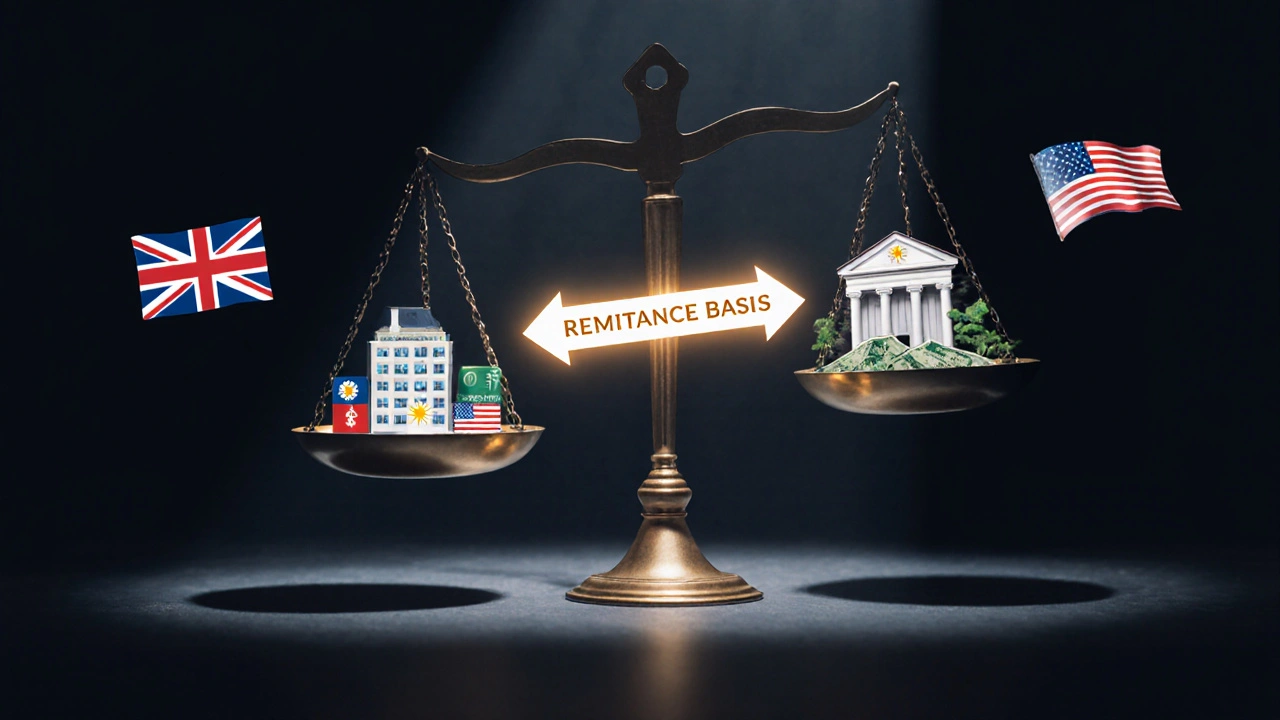If you’re moving to London from abroad, one of the first things you should figure out isn’t where to buy a sofa or which Tube line gets you to work fastest-it’s tax. The UK tax system doesn’t care if you’re from Sydney, São Paulo, or Seoul. If you live here, work here, or earn money here, the rules apply. And getting it wrong can cost you thousands.
Here’s the truth: most expats in London don’t pay more tax than locals. But many pay more than they should because they’re confused. You might think being an expat means you’re taxed differently. It doesn’t. What matters is whether you’re resident and domiciled in the UK. Those two words decide everything.
Are You a UK Tax Resident?
The UK doesn’t use your visa status or passport to decide if you owe tax. It uses the Statutory Residence Test (SRT). This is a point-based system that looks at how much time you spend in the UK each tax year (April 6 to April 5).
If you’re in the UK for 183 days or more in a tax year, you’re automatically a resident. No questions asked.
If you’re here less than 183 days, it gets trickier. You’ll be assessed on:
- How many days you spent in the UK in the previous three tax years
- Whether you have a home in the UK
- If you work full-time in the UK
- Whether you have family or ties here
For example, if you moved to London in January 2025 and worked full-time here, you’re likely a resident by June-even if you only spent 120 days in the country. Why? Because you’re working here full-time, and that’s one of the automatic ties.
Most expats who move to London for a job become UK tax residents within their first year. Don’t assume you’re not. The HMRC doesn’t wait for you to ask. They track your arrival through visa records, employer reports, and bank activity.
What’s the Difference Between Resident and Domiciled?
Resident means you live here now. Domiciled means this is where you consider your permanent home-your root, your forever place.
Most expats are resident but not domiciled. That’s important. It means you pay UK tax on your UK income (your salary, rental income here, etc.) but not on your foreign income-unless you bring it into the UK.
Let’s say you own a flat in Manila that rents for £800 a month. You don’t touch that money in the UK. You leave it in a Philippine bank. You don’t pay UK tax on it. Simple.
But if you transfer that £800 to your London bank account? Now it’s taxable. The UK taxes foreign income when it’s remitted-brought in.
There’s a catch: if you’ve been a UK resident for 15 out of the last 20 tax years, you’re treated as deemed domiciled. That means you pay tax on your worldwide income, no matter where it’s kept. That rule hits long-term expats hard.
Your Salary: How It’s Taxed
If you’re employed in London, your employer will automatically deduct tax through PAYE (Pay As You Earn). That’s the same system used by British workers.
For the 2025/26 tax year:
- Personal Allowance: £12,570 (tax-free)
- Basic rate: 20% on income between £12,571 and £50,270
- Higher rate: 40% on £50,271 to £125,140
- Additional rate: 45% on anything over £125,140
So if you earn £60,000 a year, you’ll pay:
- £0 on the first £12,570
- £7,540 on the next £37,700 (20%)
- £3,912 on the remaining £9,730 (40%)
Total tax: £11,452. Net pay: £48,548. That’s what you’ll see on your payslip.
Don’t forget National Insurance too. Employees pay 8% on earnings between £12,570 and £50,270, and 2% above that. That’s separate from income tax.

Freelancers and Self-Employed Expats
If you’re a freelancer, consultant, or run your own business in London, you’re not on PAYE. You’ll need to register as self-employed with HMRC and file a Self Assessment tax return every year.
You’ll pay:
- Income tax (same rates as above)
- Class 2 National Insurance: £3.45 per week if your profits are over £12,570
- Class 4 National Insurance: 6% on profits between £12,570 and £50,270, 2% above that
But here’s the win: you can deduct business expenses. Laptop, co-working space, software subscriptions, even your home office if you use it regularly. Keep receipts. HMRC doesn’t ask for them upfront-but they will if you’re audited.
Many expats miss out on deductions because they think only UK-based expenses count. They don’t. If you paid for a Zoom subscription from your US account to run your London business, it’s deductible.
Foreign Income and the Remittance Basis
If you’re non-domiciled, you can choose the remittance basis. That means you only pay UK tax on foreign income when you bring it into the UK.
But there’s a fee. If you’ve been a UK resident for 7 out of the last 9 years, you pay £30,000 a year to keep the remittance basis. If you’ve been here 12 out of the last 14 years? £60,000. After 15 years? You lose the option entirely.
Most expats don’t need this. If you’re not sitting on millions in foreign savings, the fee isn’t worth it. Only those with significant overseas assets-like rental properties, investments, or business profits-should consider it.
And remember: if you use foreign money to pay for a house in London, that’s a remittance. Even if you didn’t transfer cash, using foreign funds to buy property counts as bringing it in.
What About Your Home Country?
Many expats worry about being taxed twice. The UK has double taxation agreements with over 130 countries, including the US, Canada, Australia, India, and Singapore. These agreements say: you pay tax in one country, not both.
For example, if you’re an American working in London, you still file a US tax return. But you can claim a foreign tax credit for the UK tax you’ve already paid. That avoids double taxation.
But here’s the trap: some countries (like the US) tax based on citizenship, not residence. So even if you live in London, the IRS still wants a piece. You need to file both. Don’t ignore your home country’s rules.

When Do You Need to File a Tax Return?
You must file a Self Assessment tax return if:
- You’re self-employed
- You earn over £100,000
- You have foreign income over £2,000
- You receive income from property
- You’re a director of a company
If you’re just an employee earning under £100,000 with no other income? HMRC usually gets it right through PAYE. You don’t need to file.
But if you’re unsure? File anyway. HMRC doesn’t charge for filing early. They charge penalties for late filing. The deadline is January 31 for online returns. Miss it? You’re looking at £100 fine, then £10 a day after three months.
Common Mistakes Expats Make
- Thinking they’re not resident because they’re on a visa. Visa ≠ tax status.
- Not declaring foreign bank accounts. HMRC knows about them through CRS (Common Reporting Standard). They get data from over 100 countries.
- Assuming their home country’s tax rules apply here. They don’t.
- Waiting until the last minute to register with HMRC. It takes weeks to get a UTR number.
- Ignoring National Insurance. It’s not optional. It affects your state pension eligibility.
What You Should Do Now
Here’s your 5-step checklist before you land in London:
- Check your residency status using HMRC’s online tool (search ‘Statutory Residence Test’)
- Register for a Unique Taxpayer Reference (UTR) if you’re self-employed or have foreign income
- Open a UK bank account. Don’t rely on foreign transfers for rent or bills-it flags as foreign income
- Keep all receipts for expenses-even if they’re from your home country
- Speak to a UK-based tax advisor who understands expat rules. Don’t use a generalist.
You don’t need to be a tax expert. But you do need to be informed. The UK tax system isn’t designed to trick expats. But it’s complex enough that many get burned by assumptions. Don’t be one of them.
